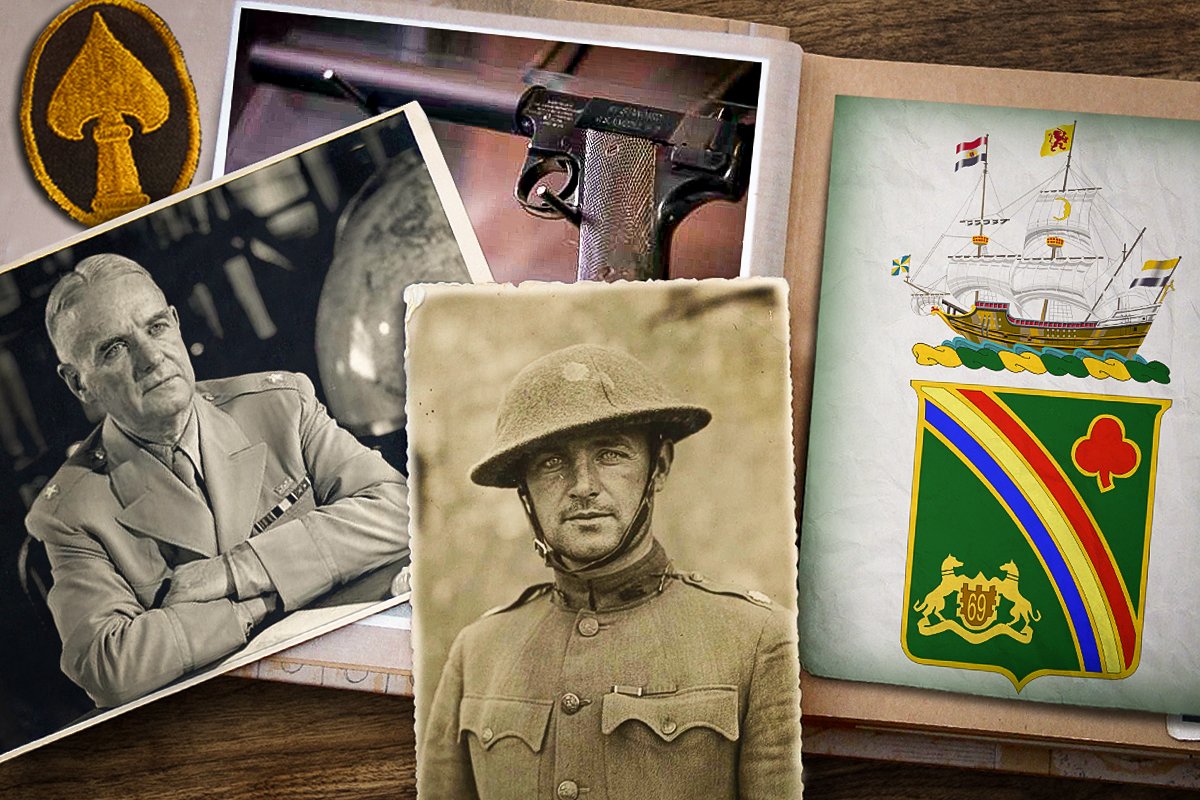How Irish American Spymaster ‘Wild Bill’ Donovan Earned His Nickname

Cover image for how William J. Donovan got his “Wild Bill” nickname. Composite created by Coffee or Die Magazine.
William J. “Wild Bill” Donovan is most revered for his role as the director of the Office of Strategic Services (OSS) — the premier paramilitary and intelligence unit that emerged during World War II and served as the precursor to the CIA. Before he was sending teams of OSS Jedburghs to conduct commando operations across Europe or unleashing psychological warfare campaigns against the Germans, this Irish American spymaster had achieved legendary status as a war hero of World War I.
In 1912, Donovan was 29 years old and had just graduated from Columbia Law School. He joined the New York National Guard’s 69th “Fighting Irish” Regiment, famous for its origins tracing back to an Irish immigrant battalion in the American Civil War.
Upon the United States’ entry into World War I, the 69th Regiment was redesignated as the 165th Regiment of the US Army and became part of the “Rainbow Division” aptly named for the cross-country troops within its ranks. It was here where his nickname was born.

For PT one day in 1918, Donovan and his troops serving in Europe ran through a 3-mile obstacle course while wearing full packs. They mounted over walls, climbed underneath barbed wire, and ran through icy streams and up and down small hills. When they came to the end, the men collapsed, while Donovan remained on his feet, unwinded.
“What the hell’s the matter with you guys?” The 35-year-old major expressed his frustration with his younger soldiers, saying, “I haven’t lost my breath.”
“But hell, we are not as wild as you are, Bill,” a soldier shouted from the rear.
When others called him Wild Bill from then on, it was said he was annoyed by it, as it painted his stoic and confident image in the wrong light. However, his wife, Ruth, was convinced that deep down inside he loved it.
His nickname didn’t fade over time — he continued to prove to others that this unorthodox leader had a wild side to him. In the Great War, he was wounded on three separate occasions and became the only American awarded the nation’s four highest medals: the Medal of Honor, the Distinguished Service Cross, the Distinguished Service Medal, and the National Security Medal.
Wild Bill’s antics would continue after he returned from war as a national hero. In 1944 the OSS Research & Development branch had a breakthrough with a suppressor. Then a general, Donovan brought it to the White House and informed President Franklin Delano Roosevelt, but the president was distracted by other important matters. Donovan, not known as a patient man, set up a sandbag and fired 10 rounds from his .22-caliber High Standard suppressed pistol.
When Roosevelt emerged to speak with Donovan, he presented the president with the bullet-riddled sandbag. Much to Donovan’s dismay, the president chose to keep the weapon because he was so impressed with the remarkable feat that it had been fired without raising alarm in the most secure building in the country. Donovan’s suppressed weapon can be found on display at the Franklin D. Roosevelt Presidential Library and Museum in Hyde Park, New York — helping keep alive the legend of Wild Bill Donovan.

Matt Fratus is a history staff writer for Coffee or Die. He prides himself on uncovering the most fascinating tales of history by sharing them through any means of engaging storytelling. He writes for his micro-blog @LateNightHistory on Instagram, where he shares the story behind the image. He is also the host of the Late Night History podcast. When not writing about history, Matt enjoys volunteering for One More Wave and rooting for Boston sports teams.
BRCC and Bad Moon Print Press team up for an exclusive, limited-edition T-shirt design!
BRCC partners with Team Room Design for an exclusive T-shirt release!
Thirty Seconds Out has partnered with BRCC for an exclusive shirt design invoking the God of Winter.
Lucas O'Hara of Grizzly Forge has teamed up with BRCC for a badass, exclusive Shirt Club T-shirt design featuring his most popular knife and tiomahawk.
Coffee or Die sits down with one of the graphic designers behind Black Rifle Coffee's signature look and vibe.
Biden will award the Medal of Honor to a Vietnam War Army helicopter pilot who risked his life to save a reconnaissance team from almost certain death.
Ever wonder how much Jack Mandaville would f*ck sh*t up if he went back in time? The American Revolution didn't even see him coming.
A nearly 200-year-old West Point time capsule that at first appeared to yield little more than dust contains hidden treasure, the US Military Academy said.












